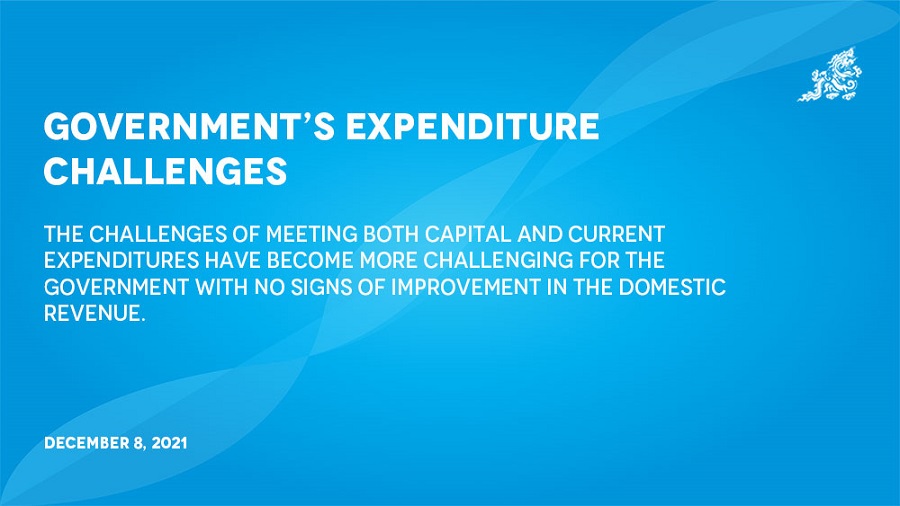
The challenges of meeting both capital and current expenditures have become more challenging for the government with no signs of improvement in the domestic revenue.
Officials say that the government has no option but to borrow to revive the economy. However, the national debt is already one of the highest in the world.
The three-month shutdown of the 1,020MW Tala hydropower plant from December-end to March-end is expected to force the government to adjust the revenue estimates. The Druk Green Power Corporation (DGPC) estimates a revenue loss of Nu 840 million (M).
Further, the government has announced a new set of tax exemptions, one of which is the reduction of Business Income Tax (BIT) to 5 percent from 30 percent for small, cottage and micro-businesses in the high-risk zones for the income year 2020-21.
The budget report estimates the domestic revenue in the current fiscal year at Nu 35.6 billion (B) against the capital expenditure of Nu 35.598B.
This means that the government must resort to borrowings for all most all the capital activities as the domestic revenue is just enough to meet the current expenditure. In other words, only Nu 1.3 million (M) of the domestic revenue will be available for capital expenditure.
Finance Minister Namgay Tshering said that borrowings would depend on the economic situation. “We need convertible currencies to import goods from third countries while there is no revenue from tourism,” he said.
Opposition Leader Dorji Wangdi said that the government has to find ways to make money as a sharp increase in borrowings would aggravate the situation.
He said that one of the revenue-generating activities that should have been kept afloat during the pandemic was the export of boulders. He added that even other economic activities should have been facilitated in a different way.
The Opposition Leader said that some of the fiscal measures including the reduction in the customs duty in the summer session had come at a “wrong time”. “Every penny helps the nation. The government could have definitely done better than they did.”
According to the finance ministry’s estimates, about 89 percent of the 12th Plan capital budget would be exhausted at the end of the current fiscal year. This means that not many Plan activities would be left for the fiscal year 2022-23.
However, officials said that there is no luxury of slowing down activities in the next fiscal year, which would be the government’s last budget year.
“In the past, there would be fewer activities in the final year of the government’s term. But the economic recovery would be affected if the government slows down spending,” he said.
The finance minister in a recent interview with Kuensel said that the government’s spending contributes about 38 percent of the GDP, which reduced to negative 10.08 percent in 2020.
The domestic revenue projections were made without taking into consideration the occasional shutdowns of the Tala plant and the new fiscal incentives.
Some officials say that the constitutional requirement of meeting all the recurrent expenditure from the domestic revenue could be breached if the revenue continues to fall.
An MP said that the domestic revenue would not be enough to meet the recurrent expenditure had the government not resorted to austerity measures. He said more austerity measures could be devised if the revenue does not improve.
However, the finance minister said that no austerity measures would be implemented. He said that the government had only rationalised expenses.
He said that it was difficult to predict when the economy would rebound as the Covid-19 situation was out of the government’s control.
The country’s public debt as of June end stood at Nu 238.398B, which is about 129.06 percent of the GDP.
The total budget for the 12th FYP is Nu 310B.



